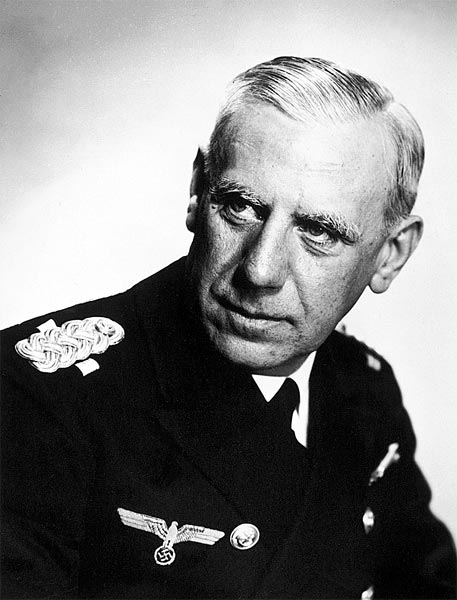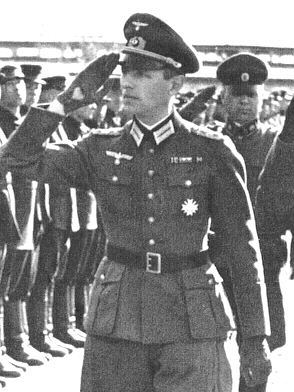Xenophon
Gone and forgotten
Organization of German intelligence
Before the First World War German military intelligence had been organized and run by the General Staff. Unfortunately, it had never been made clear that there was a distinction between secret service and military intelligence. During the First World War German military intelligence was of a mediocre quality, and was weakened by the desire of senior intelligence officers to dabble in Germany's internal politics. Following the armistice of 1918 the new Weimar Republic was suspicious of any intelligence organization, and the small German Army. the Reichswehr, had only limited resources for intelligence work. However, there was a need to establish a military intelligence organization in the Reichswehr capable of countering enemy espionage and gathering military intelligence about potential enemies. The new organization was named Abwehr (Defence), to stress its purely defensive nature.
In the early-1920's the Abwehr was purely an army intelligence organization, the navy ran its own separate service. However, in 1928 the two services were combined into a single Abwehr which assumed the dual function of a secret service and military intelligence organization. In 1932 a German naval Captain Patzig became head of the Abwehr and began to deploy agents abroad. Many Abwehr officers welcomed the Nazi seizure of power in 1933, not least because Hitler founded a unified German police force and encouraged the expansion of intelligence and counter-intelligence organizations. But the Abwehr soon realized that this was a threat to their own existence, for Himmler, the head of the SS and Police, began to form his own intelligence service.
In 1935 Captain Wilhelm Canaris became head of the Abwehr. and he reached an agreement with Himmler and Heydrich that his organization should deal with espionage abroad and investigate into espionage by foreign powers, and that the Nazi political police, the Gestapo would investigate acts of treason. But this 'gentleman's' agreement was not kept by the Gestapo and the Abwehr began to have serious doubts about Hitler and his political and military policies.
Failure of the network
Within the German Abwehr before the Second World War there were a number of anti-Nazis who opposed Hitler on political and moral grounds. Admiral Canaris, the head of the Abwehr, began to listen to these officers as he watched with alarm Hitler's political brinkmanship. Canaris considered a number of plans before the war for the arrest of Hitler and the leading Nazis, but circumstances did not permit him to initiate these plans. At the same time the Abwehr began to clash openly with one of the SS organizations, the SD Sicherheitsdienst, a security service which began to take an interest in intelligence and counter-intelligence work. Thus, at the beginning of the Second World War the German secret service and intelligence services were deeply divided.
The Abwehr's military intelligence record during the Second World War was poor, if not disastrous. From the beginning of the war in September 1939 practically all its agents in Britain and France were arrested, and the British were particularly successful at feeding the Abwehr false information which was to prove damaging to the German war effort. This was compounded by the fact that anti-Nazi Abwehr officers began to provide the British, through neutral sources, with valuable political and military intelligence. The Abwehr's few successes were due to the inspired work of individual agents in the field, one of whom successfully penetrated the-British Embassy in Istanbul. In theory the real strength of the Abwehr lay in its knowledge of the Soviet Union, as many of its officers, such as Reinhard Gehlen, were experts on Russia, and whilst its anti-Nazi members were prepared to help the British, they were unwilling to help the Soviets. But military intelligence on the Soviet Union was totally inaccurate and often wrong, and following the German invasion in 1941, the German military effort was weakened by the Abwehr's inability to provide accurate information.
The failure of the Abwehr in military intelligence, the rivalry of the SS, and the activities of the anti-Nazi Abwehr officers, combined in February 1944 to persuade Hitler to disband the organization, and hand over most of its functions to Himmler's SS.
Before the First World War German military intelligence had been organized and run by the General Staff. Unfortunately, it had never been made clear that there was a distinction between secret service and military intelligence. During the First World War German military intelligence was of a mediocre quality, and was weakened by the desire of senior intelligence officers to dabble in Germany's internal politics. Following the armistice of 1918 the new Weimar Republic was suspicious of any intelligence organization, and the small German Army. the Reichswehr, had only limited resources for intelligence work. However, there was a need to establish a military intelligence organization in the Reichswehr capable of countering enemy espionage and gathering military intelligence about potential enemies. The new organization was named Abwehr (Defence), to stress its purely defensive nature.
In the early-1920's the Abwehr was purely an army intelligence organization, the navy ran its own separate service. However, in 1928 the two services were combined into a single Abwehr which assumed the dual function of a secret service and military intelligence organization. In 1932 a German naval Captain Patzig became head of the Abwehr and began to deploy agents abroad. Many Abwehr officers welcomed the Nazi seizure of power in 1933, not least because Hitler founded a unified German police force and encouraged the expansion of intelligence and counter-intelligence organizations. But the Abwehr soon realized that this was a threat to their own existence, for Himmler, the head of the SS and Police, began to form his own intelligence service.
In 1935 Captain Wilhelm Canaris became head of the Abwehr. and he reached an agreement with Himmler and Heydrich that his organization should deal with espionage abroad and investigate into espionage by foreign powers, and that the Nazi political police, the Gestapo would investigate acts of treason. But this 'gentleman's' agreement was not kept by the Gestapo and the Abwehr began to have serious doubts about Hitler and his political and military policies.
Failure of the network
Within the German Abwehr before the Second World War there were a number of anti-Nazis who opposed Hitler on political and moral grounds. Admiral Canaris, the head of the Abwehr, began to listen to these officers as he watched with alarm Hitler's political brinkmanship. Canaris considered a number of plans before the war for the arrest of Hitler and the leading Nazis, but circumstances did not permit him to initiate these plans. At the same time the Abwehr began to clash openly with one of the SS organizations, the SD Sicherheitsdienst, a security service which began to take an interest in intelligence and counter-intelligence work. Thus, at the beginning of the Second World War the German secret service and intelligence services were deeply divided.
The Abwehr's military intelligence record during the Second World War was poor, if not disastrous. From the beginning of the war in September 1939 practically all its agents in Britain and France were arrested, and the British were particularly successful at feeding the Abwehr false information which was to prove damaging to the German war effort. This was compounded by the fact that anti-Nazi Abwehr officers began to provide the British, through neutral sources, with valuable political and military intelligence. The Abwehr's few successes were due to the inspired work of individual agents in the field, one of whom successfully penetrated the-British Embassy in Istanbul. In theory the real strength of the Abwehr lay in its knowledge of the Soviet Union, as many of its officers, such as Reinhard Gehlen, were experts on Russia, and whilst its anti-Nazi members were prepared to help the British, they were unwilling to help the Soviets. But military intelligence on the Soviet Union was totally inaccurate and often wrong, and following the German invasion in 1941, the German military effort was weakened by the Abwehr's inability to provide accurate information.
The failure of the Abwehr in military intelligence, the rivalry of the SS, and the activities of the anti-Nazi Abwehr officers, combined in February 1944 to persuade Hitler to disband the organization, and hand over most of its functions to Himmler's SS.




